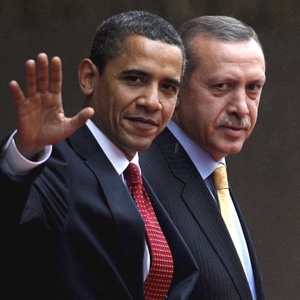At the End of the Day, Turkey is the West’s Ally

Considering the amount of this equipment, if the Persian Gulf was chosen as the basic route, a lengthy trajectory that passes through the Sea of Aden, the Red Sea and the Suez Canal would be involved that besides the security problems that would entail, is not cost-effective for the Americans. On the other hand, moving out the equipment through northern Iraq to Turkey and the Mediterranean Sea is strategically and economically a better choice for Washington.
American officials have denied the existence of such plans, which is of course not so difficult to doubt. On the threshold of the occupation of Iraq, Turkey rejected U.S. requests to fly its fighter jets from the Incirlik Air Base in Anatoly to Iraqi territory. But there are few reasons for opposition to this request at this moment, when the U.S. has decided to withdraw its combat troops from Iraq.
For long, Turkey has been a candidate for hosting missile defense shields. As a NATO member, Turkey faces two options: it either cooperates with Washington and other NATO members, or faces doubts about its membership in the organization. It is hard to deny that a large part of Turkey’s current regional and global position is the result of U.S., the West and NATO’s support. The blood in Turkey’s economic veins runs through Western capitalization. The tourism industry in this country would not be as lucrative as today if it weren’t for closer partnership with West.
Turkey is meanwhile under pressure by the West to enforce UN Security Council sanctions against Iran. Turkey is unwilling to decrease the level of its trade volume with Iran; nevertheless, at the end of the day, politicians in Ankara will decide to align themselves with the global powers and follow UN instructions. Turkey will inevitably enforce the sanctions under U.S. pressure. Its trade volume with the West dwarfs its exchanges with Iran, and there are certainly bonuses Ankara will receive as a result of cooperation with Western countries.
Turkey does not seem to be an influential power in Iran’s nuclear program. Although the Turks enjoy playing the role of the middleman, Iran’s nuclear program is too large a pill for them to swallow. Ankara is simply playing its diplomatic game shrewdly, and in a way that best serves its national interests.
Overall, Turkey is a pro-West state and a NATO member. Although the ruling AKP party favors warm ties with the East and the Muslim World and is following a Neo-Ottoman policy, the West remains its primary ally.
Bahram Amir-Ahmadian is a professor at Shahid Beheshti University, and a Caucasian affairs analyst.

